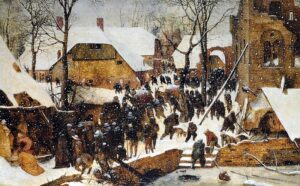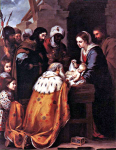Epiphany – Seeing God’s Presence Anew
 Some years it’s easy to celebrate the Feast of the Epiphany of the Lord and hear the prophet’s words, “Rise up in splendor, Jerusalem! Your light has come, the glory of the Lord shines upon you.” (Is 60:1-6) This year, with war raging in the Middle East, it’s more challenging to hear these words and remember that they have both physical, political meaning and symbolic, religious meaning. Those meanings are not meant to be taken as equivalent.
Some years it’s easy to celebrate the Feast of the Epiphany of the Lord and hear the prophet’s words, “Rise up in splendor, Jerusalem! Your light has come, the glory of the Lord shines upon you.” (Is 60:1-6) This year, with war raging in the Middle East, it’s more challenging to hear these words and remember that they have both physical, political meaning and symbolic, religious meaning. Those meanings are not meant to be taken as equivalent.
Jerusalem in this context is not just a city in the Middle East. It is not just a city revered by members of three great faith traditions – Judaism, Christianity, and Islam. The prophet Isaiah was speaking of a restored city, a center of life and faith for the Jewish people as they returned from exile. Yet even in this prophecy, Jerusalem is more than just a capital city. Jerusalem is the center from which God will rule the entire world. The city itself is shining in the glory of the Lord – a glory that shines in the darkness and attracts all to itself. This is the city in the symbolic, religious perspective.
Peoples from all over the world will stream to the Lord, made manifest in this Jerusalem, bringing rich gifts with them. The prophecy is not just speaking of the people of Israel as included in the glory of the Lord. This is a vision for all the peoples of the world. All will be welcome in this city of the Lord.
The Psalmist sings of a similar reality. “Lord, every nation on earth will adore you.” The rulers will govern with justice, peace will flower forever, all rulers will bring gifts in tribute to the Lord and the poor and afflicted will find help – “the lives of the poor he shall save.” (Ps 72:1-2, 7-8, 10-11, 12-13)
Another theme enters the picture with this notion of the Lord protecting the poor. The Lord’s glory shines forth and the Lord brings justice and peace and help for the poor. Not the standard expectation of the coming of a deity or a ruler!
Both Saints Luke and Matthew tell of the birth of Jesus in Bethlehem. Matthew (2:1-12) notes this happened “in the days of King Herod.” (That phrase in Matthew’s Gospel has allowed scholars to set an approximate time frame for Jesus’ birth and life based on known facts about the time in which each king and emperor ruled.) While they were in Bethlehem, wise men (magi) came to Jerusalem in search of a “newborn king of the Jews.” Jerusalem was the capital city and Herod was enthroned there, so they naturally assumed Herod would know of the birth of his successor and be happy to have an heir. Herod was surprised by the news and not a little dismayed by it. He had no newborn heir! Jerusalem was not alive with joy over the birth of a new prince.
The wise men, astrologers, had seen a new star in an area of the sky associated with Israel. It was one that indicated the birth of a new ruler, according to their understanding of the movements of stars and other heavenly bodies. The priests whom Herod consulted explained that the child whose birth was long ago foretold would be found in Bethlehem, the city of King David. This was even more disturbing. Absolute and autocratic rulers then and now don’t like to know that ones who will oppose or replace them are out and about. They tend to try to imprison or kill them first. Herod was no exception. He instructed the magi to find the child and return to him with the address at which the family were living. Why? “That I too may go and do him homage.” Yea, right! His plan was to kill the child.
The magi went to Bethlehem and found the family. They presented their gifts for the child and bowed down to honor him. This was a child born to be king, after all. Not fooled by Herod, and warned in a dream not to return to Jerusalem, they returned home by another route, rejoicing in the success of their journey.
The magi were the first non-Jews to visit the newborn child and his family. Prior to that, only local people, including shepherds, knew they were in Bethlehem and that a child had been born. But with the visit of the magi, the Gentile world got its first glimpse of the child who would open the door wide for all peoples of the earth to share in the kingdom of the Lord, the Holy One shining in the new Jerusalem. The glory of the Lord shone forth through the child they found. It was an Epiphany, seeing God’s presence anew.
St. Paul takes the story a bit farther. He is working with Gentiles after having been tossed out by the Jewish communities in which he first preached the Good News revealed to him at his conversion. “The Gentiles are coheirs, members of the same body, and co-partners in the promise in Christ Jesus through the gospel.” (Eph 3:2-3a, 5-6)
The Lord has come. He has come to Jerusalem. He has come for the poor and the rich – for all peoples of the world. Jerusalem is no longer a city belonging to any one people in the religious sense.
Epiphany refers to seeing God’s presence in a new way. In the Christian community around the world and in many cultures, this day of celebration includes not just the magi. It also includes the celebration of the Lord’s baptism, in which the heavens opened and the Spirit descended on Jesus like a dove, revealing him as the one whose coming had been promised from ancient times. (Mk 1:9-11 and Jn 1:29-34) In some communities, it is also a celebration of the first miracle, performed at a marriage in Cana when water was turned into wine and Jesus’ first disciples began to realize that he might be more than just a great teacher. (Jn 2:1-11)
What do we see at Epiphany today? A war is raging, though not yet in Jerusalem. Peoples in the Middle East are fighting and dying once again. Peoples in Europe and Africa are as well this year. Where do we see the Lord’s presence? How does his coming change the equation in these days of so much pain and struggle. How is he present in the lives of refugees and asylum seekers? Where will they find safe homes, where their children will not be menaced by gangs or political parties seeking their own benefit rather than the common good?
Pray with me for peace this day. For justice and mercy. For a willingness to listen and find common ground with our opponents. For a day in which we can joyfully cry out, “Rise up in splendor, Jerusalem! Your light has come, the glory of the Lord shines upon you.” May this Jerusalem be the one in which we are living each day, working for justice, peace, and the good of all of the Lord’s people. May we see God’s presence shining forth anew in our lives and our world.
Readings for The Epiphany of the Lord – Cycle B
Read More














